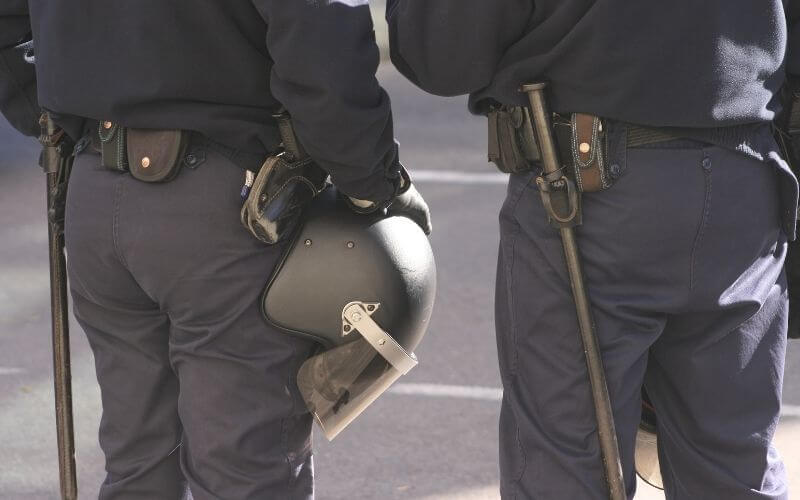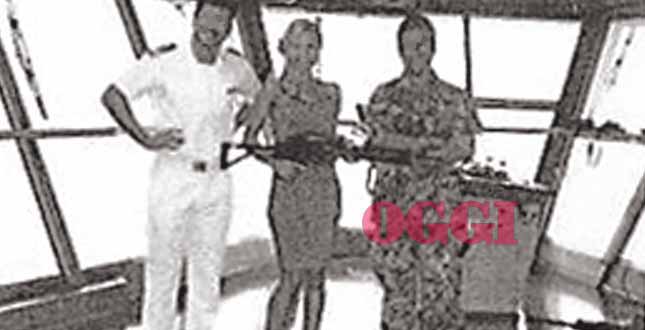Cruise ships often have armed security personnel on board. These security teams are trained to handle various threats.
Embarking on a cruise vacation promises relaxation and a wealth of memorable experiences, but safety remains a paramount concern for travelers. Cruise lines take security seriously, implementing measures that reflect the importance of passenger safety. With a rising focus on maritime security, cruise ships now typically feature a contingent of security officers who are trained to mitigate risks and respond to incidents.
These teams operate discreetly, ensuring the safety of guests while maintaining the leisurely atmosphere of a cruise. Cruise companies continually evolve their security measures, adapting to new global security challenges and providing peace of mind for their passengers. Understanding the presence of armed security on board is essential for appreciating the expansive safety protocols modern cruise ships employ.

Credit: www.cruiselawnews.com
Quick Navigation
- Navigating The Waters Of Cruise Ship Safety
- The Presence Of Security Personnel On Cruise Ships
- Armed Versus Unarmed Guards
- Collaborating With International Maritime Law
- High-stakes Situations And Security Response
- Balancing Safety And Enjoyment On Vacation
- Frequently Asked Questions On Do Cruise Ships Have Armed Security
- Conclusion
Ensuring safety on a cruise ship is much like steering a giant vessel through vast oceans. The topic of armed security on board cruise ships is a complex one. Guests and crew alike value peace of mind when sailing the seas. Let’s dive into the layers of safety measures that keep the cruise experience both enjoyable and secure.
Evolving Security Measures
Cruise lines consistently upgrade their security. From advanced screening equipment to enhanced surveillance, protections are in place. Armed security personnel are part of this evolution. Although policies vary, many ships have discreet, armed security teams trained to handle various threats.
- Advanced screening at embarkation
- 24/7 surveillance across the ship
- Armed security details
Security teams work closely with international maritime regulations. They ensure safety without intruding on the guest experience. Regular training and drills keep these teams ready for potential scenarios.
Passenger Safety Protocols
Passenger well-being is the centerpiece of cruise ship operations. Every cruise line maintains strict safety protocols to protect guests. Passengers can also contribute to a safe environment by following these guidelines.
- Attend mandatory safety drills
- Report any suspicious activity
- Adhere to ship rules and regulations
Preparedness is key to ensuring a secure experience. Crew members train in emergency response and crisis management. They keep passengers informed on safety procedures from day one. Beyond drills, continual safety messages remind all onboard of the importance of vigilance.
The Presence Of Security Personnel On Cruise Ships
When you step onto a cruise ship, the sense of security is palpable. Uniformed officers roam the decks with a calm authority. Guests enjoy their holiday without worry. But, do cruise ships have armed security? The answer lies in the trained security personnel aboard.
Daily Duties Of Onboard Security
Onboard security personnel are the unsung heroes of the cruise experience. Their presence may not always be obvious. Yet, they are always vigilant.
Their duties include:
- Monitoring surveillance systems
- Patrolling public areas
- Checking passenger identification
- Conducting security screenings
- Responding to incidents
They work around the clock to ensure the safety of everyone aboard.
Specialized Training For Scenarios
Security teams on cruise ships aren’t just any ordinary guards. They undergo specialized training to handle intense scenarios.
| Scenario Type | Training Focus |
|---|---|
| Emergency Situations | Evacuation procedures, life-saving techniques |
| Crowd Management | De-escalating tensions, managing large groups |
| Medical Emergencies | First aid, CPR, emergency medical response |
| Security Breaches | Sensitive case management, investigation skills |
Crew members are also trained in anti-piracy measures and other maritime threats. They’re prepared for the unexpected, always ready to protect.
Armed Versus Unarmed Guards
Many people wonder if cruise ships have armed guards. On the high seas, safety is a top concern. Guards play a key role in protecting passengers. But, not all guards carry weapons. Let’s explore the world of onboard security.
Regulations On Firearms At Sea
At sea, rules about firearms are strict. Countries have laws that ships must follow. Ships sail under a flag. This flag country’s laws apply to the ship.
- International Maritime Organization (IMO): Sets global standards.
- Flag State: The country a ship is registered with. Has its own rules.
- Port State Control (PSC): Local laws at each port.
Ships might have armed guards, but they follow these strict rules.
Comparison With Other Travel Industries
Airlines often have air marshals. These are undercover security. They are on flights to keep passengers safe. Trains and buses usually have security too. But they may not carry weapons.
| Travel Industry | Security Type |
|---|---|
| Airlines | Armed air marshals |
| Trains/Buses | Unarmed guards |
| Cruise Ships | Armed/Unarmed – Depends on regulations |
Cruise ships sometimes have armed guards. It depends on many factors.

Credit: www.cruisemummy.co.uk
Collaborating With International Maritime Law
Cruise ships sail on international waters. This means they need to follow specific laws. One set of these laws is known as International Maritime Law. This law helps keep the oceans safe. Cruise companies work with these laws to make sure everyone on the ship is safe. But, do they have armed security?
Security on board is not simple. The answer varies. Some ships have security guards, but they might not carry guns. These guards use other ways to keep passengers safe. They train for emergencies and work with port authorities. But, when sailing through risky waters, things are different.
Piracy And Ship Security
One big risk at sea is piracy. Pirates can attack ships and take things. To stop this, some ships do have armed guards. These guards are there to keep the pirates away. International laws say it’s okay for ships to have these guards in dangerous areas. They also work with groups like the Coast Guard to protect the sea.
- Trained security personnel on board
- Use of non-lethal weapons
- Cooperation with international naval fleets
Jurisdictional Challenges
Ships move through many areas. These areas have their own laws. This is called jurisdiction. It’s like an invisible line in the water that decides which laws to follow. If something happens on the ship, it can be tricky.
Dealing with these lines is hard. Cruise ships need to know different laws. They talk with countries to make sure they do the right thing. If there’s a crime, the ship’s flag state laws apply. But, they might also talk to the nearest country or the passenger’s home country.
| Ship’s Flag State | Applies the laws of the country the ship is registered. |
| Nearest Coastal State | May have legal say if the incident is close to their waters. |
| Passenger’s Home Country | Could be involved, depending on the situation. |
High-stakes Situations And Security Response
When it comes to safety on the high seas, cruise ships prepare for any scenario. Security response aboard these vessels is geared toward handling high-stakes situations that might arise. Whether it’s dealing with onboard threats or conducting emergency drills, passenger safety remains the top priority.
Handling Onboard Threats
Cruise lines take security threats very seriously, equipping ships with trained security personnel. These teams have protocols for different types of onboard incidents. They handle everything with precision, from minor disputes to more serious altercations.
- 24/7 Surveillance: Cameras monitor all activity.
- Access Control: Selected areas on the ship are restricted.
- Rapid Response: Security teams can deploy anywhere on the ship quickly.
Emergency Drills And Passenger Preparedness
Aside from professional armed security, cruise ships insist on preparing passengers for emergencies. Upon embarkation, passengers must participate in safety drills.
- Muster Drill: Passengers learn about their specific muster stations.
- Life Jackets: Demonstrations show how to wear life jackets correctly.
- Evacuation Procedures: Crew members guide through the escape routes.
In these drills, teams ensure everyone understands their roles to maintain order during an emergency. This level of preparedness keeps passengers safe and helps mitigate risks effectively.

Credit: www.cruiselawnews.com
Balancing Safety And Enjoyment On Vacation
When setting sail on a dreamy cruise vacation, safety remains a paramount concern. To ensure peace of mind, cruise lines masterfully balance stringent security measures with an atmosphere ripe for relaxation and fun. This unique combination allows travelers to fully immerse in the joys of their holiday without a hint of worry.
Security Presence Impact On Cruise Experience
Cruise guests often question the visibility of armed security personnel aboard. The presence of these professionals is subtle yet vital. Cruise lines ensure that security does not overshadow the easy-going spirit of a holiday. Security teams blend into the background, always watchful, never intrusive.
- Officers are trained to be discreet.
- Security measures are integrated seamlessly into the cruise routine.
- Routine drills prepare guests for emergency procedures without causing alarm.
Overall, the security presence is designed to soothe, not startle, ensuring that fun remains the front runner on every traveler’s itinerary.
Innovative Technologies In Cruise Safety
To bolster security without burden, cruise ships adopt cutting-edge technologies. These innovations promise robust protection while upholding the essence of vacation enjoyment.
| Technology | Purpose | Passenger Benefit |
|---|---|---|
| Advanced Surveillance | Monitor public areas | Unobtrusive oversight |
| Electronic Access | Manage cabin entry | Personal safety |
| Emergency Communication | Instant alerts | Swift information |
These smart safety features instill confidence and allow guests to embrace the full scope of cruise experiences, from sun decks to starlit dinners. As vacationers revel in the moment, they remain cocooned in a high-tech safety net.
Frequently Asked Questions On Do Cruise Ships Have Armed Security
Is Armed Security Present On Cruise Ships?
Yes, many cruise ships have trained security personnel on board. These officers may carry non-lethal weapons for defusing situations and ensuring passenger safety.
What Security Measures Do Cruise Lines Implement?
Cruise lines typically employ multiple security measures including CCTV, access control systems, and trained security personnel. Some may coordinate with port authorities for armed protection if needed.
How Do Cruise Ships Handle Emergency Situations?
In emergencies, cruise ships follow strict protocols involving alarm systems, public announcements, and muster stations. Trained security teams are ready to respond to various threats to ensure passenger safety.
Can Passengers Bring Firearms On A Cruise?
Passengers are generally prohibited from bringing firearms or weapons on board cruise ships. Such items are considered safety risks and against cruise line policies.
Conclusion
Navigating the waters of safety on cruise ships brings us to security measures at sea. Many ships now implement armed personnel for passenger protection. This shift towards more robust defense protocols demonstrates the industry’s commitment to safety. As you plan your next vacation, consider the peace of mind that comes with enhanced security on board.
Ready to set sail? Rest assured, your safety is taken seriously on the high seas.



